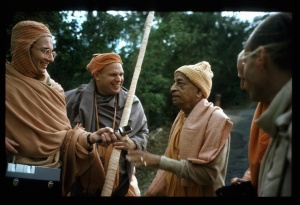SB 5.6.15

A.C. Bhaktivedanta Swami Prabhupada
TEXT 15
- ko nv asya kāṣṭhām aparo 'nugacchen
- mano-rathenāpy abhavasya yogī
- yo yoga-māyāḥ spṛhayaty udastā
- hy asattayā yena kṛta-prayatnāḥ
SYNONYMS
kaḥ — who; nu — indeed; asya — of Lord Ṛṣabhadeva; kāṣṭhām — the example; aparaḥ — else; anugacchet — can follow; manaḥ-rathena — by the mind; api — even; abhavasya — of the unborn; yogī — the mystic; yaḥ — who; yoga-māyāḥ — the mystic perfections of yoga; spṛhayati — desires; udastāḥ — rejected by Ṛṣabhadeva; hi — certainly; asattayā — by the quality of being insubstantial; yena — by whom, Ṛṣabhadeva; kṛta-prayatnāḥ — although eager to serve.
TRANSLATION
"Who is that mystic yogī who can follow the examples of Lord Ṛṣabhadeva even with his mind? Lord Ṛṣabhadeva rejected all kinds of yogic perfection, which other yogīs hanker to attain. Who is that yogī who can compare to Lord Ṛṣabhadeva?"
PURPORT
Generally yogīs desire the yogic perfections of aṇimā, laghimā, mahimā, prākāmya, prāpti, īśitva, vaśitva and kāmāvasāyitā. Lord Ṛṣabhadeva, however, never aspired for all these material things. Such siddhis (perfections) are presented by the illusory energy of the Lord. The real purpose of the yoga system is to achieve the favor and shelter of the lotus feet of the Supreme Personality of Godhead, but this purpose is covered by the illusory energy of yogamāyā. So-called yogīs are therefore allured by the superficial material perfections of aṇimā, laghimā, prāpti and so forth. Consequently ordinary yogīs cannot compare to Lord Ṛṣabhadeva, the Supreme Personality of Godhead.